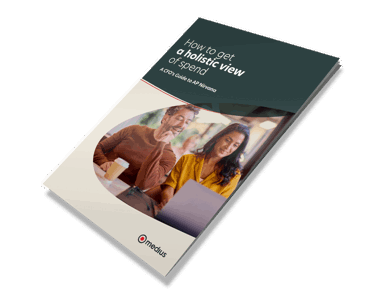How to Get a Holistic view of Spend in Four Steps: A CFO's Guide
With all the advantages of today’s digital universe, many CFOs still struggle with limited visibility into cash flow and day-to-day operating costs. It seems puzzling that big organizations face this age-old finance challenge: the inability to see a single view of their company’s financial position.
Don’t panic yet. It’s not all doom and gloom for today’s CFO. The good news is that you can achieve a holistic view of spend, and it starts in Accounts Payable.
In this blog, we’ll share how top-performing companies leverage the latest AI-driven technologies to gain ultimate visibility and how CFOs can reach true AP Nirvana by exploring:
- Common challenges for finance
- What is AP Nirvana, and how do I get there?
- Four steps to achieve a holistic view of spend
Common challenges for finance
Finance teams manage critical functions of a business—control, risk, efficiency, and cost. As a finance professional, you know that these responsibilities come with challenges. Some have been around for decades, and some are entering the workforce as technology and workplace dynamics evolve.
What prevents you from getting a single view of your company’s financial position? It often comes down to:
- Complex organizational setup with multiple teams, locations, and suppliers. 58% of finance professionals report they work with procurement only occasionally.
- Manual processes slow decision-making. As a result, partners suffer. In fact, nearly half (45%) of supplier payments are reported as late.
- Incomplete and delayed data from business units.
- Siloed functions across finance teams, ERPs, and other systems.
- Incomplete analytics for real-time decision-making.
So, with all these challenges, what can you do to move your business forward? How can you address it? You start with AP.
What is AP Nirvana, and how do I get there?
The truth is: nothing is perfect. However, getting closer to AP nirvana is achievable, and a holistic view of spend for a CFO is critical. When a CFO has a unified view, they can:
- Focus on strategic growth initiatives.
- Optimize working capital and cash flow management.
- Get answers when you need them.
- Eliminate surprise expenses, unnecessary spending, and fraud.
- Motivate your team with strategic projects, not manual, frustrating tasks.
Automation is great and has driven many efficiencies across finance and AP teams. Sometimes, however, automation alone isn’t enough. What many companies are really seeking is autonomous AP.
Over 26% of respondents to SSON’s AP Automation Virtual Summit reported that less than a quarter of their AP process is automated. And only 8% of respondents claim to have their reconciliation and reporting automated. To put it plainly, they still have a long way to go.
They need more; primarily, they are missing the visibility they need to operate in today’s fast-moving business environment. For example, today’s finance teams require data at the point of decision-making, so they can spot potential risks immediately or see duplicate invoices as they occur and resolve them.
A holistic view gives you the answers you need when you need them. Here are four steps to get you to a holistic view of AP.
Four steps to achieve a holistic view of spend
Step 1: Audit your needs
The pandemic has driven major shifts in the supply chain, remote working, economic instability, and price fluctuations – to name a few. More complex industries, like manufacturing, have felt even greater pressures and burdens of change. Many CFOs are expanding their strategic role, so they expect their core finance functions to run smoothly and require instant insights.
Perform an audit to see if you are meeting your current needs. Ask yourself and your team the following questions:
- Do you have a complete picture – of cash flow, timely reports, forecasts and operating costs?
- Can you identify gaps, risks, and answers – in real-time spending analysis, supplier payments and discounts, fraud, and invoice processing?
- What is the stress and satisfaction level – with average invoice processing time, employee satisfaction, finance and procurement, and supplier relationships?
Step 2: Go beyond basic automation
AP is one of the most process-centric functions in a business – touching nearly all departments. A gap in AP means gaps in many areas of the organization. So, automation for AP makes sense.
Many businesses started automating by moving to e-invoicing, which means removing paper is no longer a challenge. However, bottlenecks and manual interventions are stills showing up, and insights are still lacking. According to Ardent Partners: the State of ePayables 2022 report:
- 45% of AP organizations report a high percentage of invoice exceptions as a top challenge
- 48% of AP organizations report reporting and analytics a top priority.
It’s time to evaluate your automation journey, and answer the question: can my current process and solutions address my visibility needs?
Begin by analyzing your core KPIs in comparison to top-performing AP organizations. If your metrics fall short of industry standards, don't panic. Recognizing areas for improvement can help you pinpoint process bottlenecks. Take note of what needs fixing and establish an achievable KPI goal.

Step 3: Build a case for autonomous AP.
If you've automated some AP components, that's great. However, if your current process and ERP solution still can't provide a comprehensive view, it's time to consider implementing autonomous AP.
What is Autonomous AP?
Autonomous AP goes beyond basic automation by:
- Combining digitization and artificial intelligence (AI) for a seamless, autonomous process; and
- Leveraging AI, combined with machine learning (ML) and optical character recognition (OCR), from capture through coding, approval, and payment.
It is more capable of learning and adapting, speeding up your processing time, and ensuring you catch errors and fraudulent trends sooner and more often than traditional automated solutions.
How does this impact visibility?
While some data can be digitized, other information, like PDFs or invoices with lots of line items, may remain unstructured. But with autonomous AP, even the most complex data can be captured and organized, giving you a comprehensive view of your spending, including:
- A more accurate picture of cash flow
- More accurate and timely forecasting
- KPI tracking and improvement
- Less human intervention
- Real-time error and fraud notifications
- Employee job satisfaction
If you are ready to move forward with autonomous AP, now it’s time to get your stakeholders on board.
Step 4: Motivate stakeholders for change.
Many CFOs believe streamlining cash management, reducing processing costs and avoiding exceptions to unblock payments key reasons to automate AP. This strategy boosts visibility,.
If you agree, it's time to motivate your business to embrace the change.
Driving a technology change across an organization can be difficult, especially if your ERP has AP functionality. However, you can succeed when you rally your team to support and:
- Perform and document an assessment (Steps 1-3).
- Involve critical stakeholders (IT) and end users impacted by lack of visibility.
- Showcase the ROI in savings, employee satisfaction, fraud and risk reduction, supplier satisfaction, and timely reporting.
- Include specific case studies or examples.
Now you are ready to begin your journey and move towards AP Nirvana, remove stress and gain a holistic view of spend.
Reach out to our team for guidance and tips.
Tired of the inefficiencies of PDF invoices and painful AP processes?
Discover how AI-powered AP automation can streamline your invoice through payment operations, unlocking unprecedented visibility, and optimizing your cash flow.







